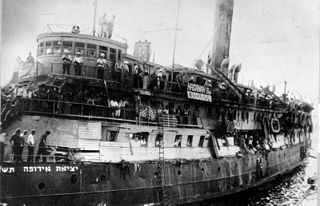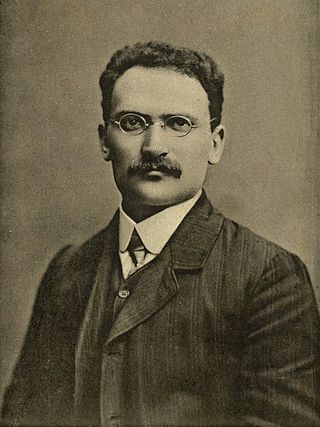
Zionism is a nationalist movement that emerged in Europe in the late 19th century aiming for the establishment of a homeland for the Jewish people, particularly in Palestine, a region roughly corresponding to the Land of Israel in Jewish tradition. Following the establishment of the State of Israel, Zionism became an ideology that supports the development and protection of Israel as a Jewish state. It has also been described as Israel's national or state ideology.
Haganah was the main Zionist paramilitary organization that operated for the Yishuv in the British Mandate for Palestine. It was founded in 1920 to defend the Yishuv's presence in the region, and was formally disbanded in 1948, when it became the core force integrated into the Israel Defense Forces shortly after the Israeli Declaration of Independence.

David Ben-Gurion was the primary national founder of the State of Israel as well as its first prime minister. As head of the Jewish Agency from 1935, and later president of the Jewish Agency Executive, he was the de facto leader of the Jewish community in Palestine, and largely led the movement for an independent Jewish state in Mandatory Palestine.
This is a partial timeline of Zionism in the modern era, since the start of the 16th century.

A homeland for the Jewish people is an idea rooted in Jewish history, religion, and culture. The Jewish aspiration to return to Zion, generally associated with divine redemption, has suffused Jewish religious thought since the destruction of the First Temple and the Babylonian exile.

The one-state solution is a proposed approach to resolving the Israeli–Palestinian conflict, according to which one state would be established between the River Jordan and the Mediterranean. Proponents of this solution advocate a single state encompassing the currently recognized state of Israel, the West Bank and the Gaza Strip. The term one-state reality describes the belief that the current situation in Israel/Palestine is de facto a single state. The one-state solution is sometimes also called a bi-national state, owing to the hope that the state would be a homeland for both Jews and Palestinians.

The Jewish Legion was an unofficial name used to refer to five battalions of the British Army's Royal Fusiliers regiment, which consisted of Jewish volunteers recruited during World War I. In 1915, the British Army raised the Zion Mule Corps, a transportation unit of Jewish volunteers, for service in the Gallipoli campaign. Two years later in August 1917, the decision was made to raise an infantry battalion of Jewish soldiers which would be integrated into an existing British Army regiment.

The World Zionist Organization, or WZO, is a non-governmental organization that promotes Zionism. It was founded as the Zionist Organization at the initiative of Theodor Herzl at the First Zionist Congress, which took place in August 1897 in Basel, Switzerland. The goals of the Zionist movement were set out in the Basel Program.

Histadrut, or the General Organization of Workers in Israel, originally, is Israel's national trade union center and represents the majority of Israel's trade unionists.
Bank Leumi is an Israeli bank. It was founded on February 27, 1902, in Jaffa as the Anglo Palestine Company as subsidiary of the Jewish Colonial Trust Limited formed before in London by members of the Zionist movement to promote the industry, construction, agriculture, and infrastructure of the land hoped to ultimately become Israel. Today, Bank Leumi is Israel's largest bank, with overseas offices in Luxembourg, US, Switzerland, the UK, Mexico, Uruguay, Romania, Jersey, and China.
Palestinian Jews or Jewish Palestinians were the Jewish inhabitants of the Palestine region prior to the establishment of the State of Israel in 1948.
The Second Aliyah was an aliyah that took place between 1904 and 1914, during which approximately 35,000 Jews, mostly from Russia, with some from Yemen, immigrated into Ottoman Palestine.

Zion Square is a public square in Jerusalem, located at the intersection of Jaffa Road, Ben Yehuda Street, Herbert Samuel Street, and Yoel Moshe Salomon Street.
As an organized nationalist movement, Zionism is generally considered to have been founded by Theodor Herzl in 1897. However, the history of Zionism began earlier and is intertwined with Jewish history and Judaism. The organizations of Hovevei Zion, held as the forerunners of modern Zionist ideals, were responsible for the creation of 20 Jewish towns in Palestine between 1870 and 1897.
Yehoshua Ben-Zion was an Israeli banker. He served as the managing director of Israel-British Bank. Following the collapse of the bank in July 1974, owing British investors £46.6 million, Ben-Zion was convicted of embezzling £20 million from the bank. He was sentenced to 12 years in prison. After urging of the Israeli prime minister Menachem Begin in 1977, Ben-Zion was pardoned by the Israeli president Ephraim Katzir, on medical grounds. He was released after serving three years.

Poale Zion was a movement of Marxist–Zionist Jewish workers founded in various cities of Poland, Europe and the Russian Empire at about the turn of the 20th century after the Bund rejected Zionism in 1901.

Dov Ber Borochov was a Marxist Zionist and one of the founders of the Labor Zionist movement. He was also a pioneer in the study of the Yiddish language.
Labor Zionism or socialist Zionism refers to the left-wing, socialist variation of Zionism. For many years, it was the most significant tendency among Zionists and Zionist organizations, and was seen as the Zionist sector of the historic Jewish labour movements of Eastern Europe and Central Europe, eventually developing local units in most countries with sizable Jewish populations. Unlike the "political Zionist" tendency founded by Theodor Herzl and advocated by Chaim Weizmann, Labor Zionists did not believe that a Jewish state would be created by simply appealing to the international community or to powerful nations such as the United Kingdom, Germany, or the former Ottoman Empire. Rather, they believed that a Jewish state could only be created through the efforts of the Jewish working class making aliyah to the Land of Israel and raising a country through the creation of a Labor Jewish society with rural kibbutzim and moshavim, and an urban Jewish Proletariat.

Ahdut HaAvoda was the name used by a series of political parties. Ahdut HaAvoda in its first incarnation was led by David Ben-Gurion. It was first established during the period of British Mandate and later became part of the Israeli political establishment. It was one of the forerunners of the modern-day Israeli Labor Party.

Jacob (Yankele), Eugen, Jean Salomon was a member of the Haganah and Palmach. He commanded the Palmach's Fourth Battalion and served as commander of the Haganah in Eastern Europe.












